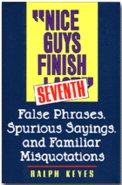
| Publisher: | HarperPerennial |
| Copyright: | 1992 |
| Printing: | 1993 |
| ISBN: | 0-06-272039-2 |
| Format: | Trade paperback |
| Pages: | 198 |
"Nice guys finish last" is so common a phrase that, for most of us, it's entered the territory of unattributed aphorism. More accurate books of quotations track it down to baseball manager Leo Durocher in 1946. But as best Keyes and other investigators can determine, Durocher never said those four words in the interview. The actual quote was something more like "The nice guys are all over there, in seventh place, not in this dugout."
Ralph Keyes takes from this the title of this book on misquotes, misattributions, and the transformations quotes undergo over time. Even the title is still a transformation of the true quote, making it shorter, pithier, and echoing its better-known distortion. This process, and many examples tracing similar evolution in other quotes, is a major topic of Nice Guys Finish Seventh.
Keyes does best when looking at the big picture or when digging into the history of a quote with several layers of borrowing or rewriting. Much of the better material is near the front of the book, where he leads with his most interesting examples and provides an overview of misquoting and misattribution and classifying some of the ways in which quotes transform and migrate. Unfortunately, he has a tendency to just give the reader a tour through things he's discovered, to list what apparently happens without much analysis. I wish there were more meat to his theories. I could have used more classification and more discussion of why particular figures become quote magnets.
I wanted this book to be an analytical study, but it's mostly (particularly in the second half) a collection of anecdotes and analyses of individual quotes. For what it is, it's interesting, if a touch short. Many of the anecdotes are interesting, both for the story and for an inside look into the difficulties of tracking down a particular quote and the flaws in quote collections (even the big names, like Bartlett's). But overall, the book was slighter than I was hoping, outside of the excellent first couple of chapters.
Much of the disappointment for me is Keyes's unfortunate tendency to spend time on quotations that I consider unworthy of the attention. I have a similar problem with the canonical quotation reference works. I think a quotation should be an expression of a complete thought in a sufficiently unique and interesting way that one can readily believe it's the product of a particular mind. Stock phrases, even ones with attributable origin like "nice guys finish last," to me barely qualify as quotations. Keyes spends far too much time for my taste on such phrases as "the New Deal," "the Great Society," or "the right stuff." I hardly need a book to tell me that Sherman is probably not the first person in the history of the English language to say "war is hell," or that this may be a compaction of things he said across multiple occasions. At some point of decreasing complexity, a phrase is such an obvious combination of English words that it ceases to be a quote in any interesting way.
Keyes also makes a few dubious connections when tracing the history of particular quotations. He gives lip service to the idea that a great quote may be about the phrasing rather than the underlying meaning, but then takes issue with the originality of some quotations by comparing them to similar ideas expressed different ways. This would be more interesting within a larger framework that included a discussion of what makes a quotation and how much it can change before it becomes something else, but that's the sort of framework this book is sadly lacking. As is, connecting memorable turns of phrase with unmemorable and clunky statements of the same idea from a century earlier lacks interest for me.
Much of the book is given over to thematic chapters (sports, entertainment, politics, literature), and while there's a tiny bit of discussion of how quote borrowing and reattribution works differently in different fields (entertainment and politics being the most interesting), it's mostly a way to group the huge collection of anecdotes that Keyes had found. Since the investigations of quotes often lead to similar histories of tweaks, polishings, and attribution shifts, the book takes on a sense of monotonous sameness and starts to feel a bit like reading a quotation compilation. If the quotes were more interesting, they would have redeemed the approach, but unfortunately few of the quotes Keyes digs into are more than a sentence, and many of them are only a phrase.
I found Nice Guys Finish Seventh to be a bit of a disappointment but not really a failure. It wasn't the book I hoped it would be and thought it would become from the first few chapters, but it was still worth reading. It also has an excellent reference index, so while it's not comprehensive enough to be a research tool for general quotations, it's easy to find a half-remembered quote discussion.
Recommended for quote aficionados and for the first couple of chapters, but not worth an exhaustive search.
It appears that Keyes has taken the basic idea and turned it into a dictionary of misattributed quotes entitled The Quote Verifier, which probably explains why this book is out of print. I've not read the newer version, but it sounds like the best material from this book contributed to the introduction. That still isn't the book that I was hoping for, but it looks more straightforward about what it's trying to accomplish and may be a better choice if you're looking for a reference work rather than a discussion.
Reviewed: 2008-12-26